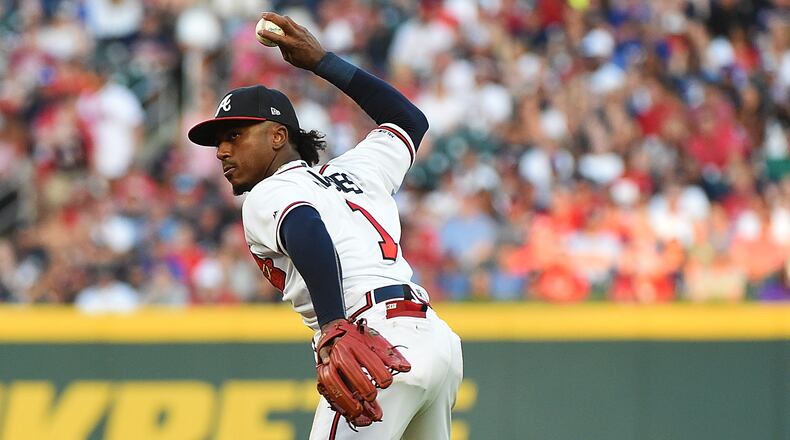This weekend, I reluctantly dipped into the FanGraphs site to tour the foreign landscape of baseball analytics.
I consider this a world hostile to humanity, one that transforms the satisfying, visceral experience of baseball into cold coefficients. Analytics bleeds joy from the game. It turns drama into data. For the sake of simple enjoyment, I don’t need to know the chemical composition of a Twix bar any more than Mike Trout’s WAR number.
But, just for a moment, I’m trying to quantify fielding and defense, curious about where the Braves fit into the big picture. Just watching them, and specifically watching the infield defense, it seems that they catch and throw fairly effectively. Faint praise, but that beats loud bile.
There are days like Saturday when the defense fails them, errors by the third baseman and the closer accounting for five unearned Philadelphia runs. And many other days when somebody stands on his head on the infield and saves an inning and eventually a game.
The simple eye test reveals not an impenetrable defense — they’ll kick it around a little bit. But certainly one worthy of notice, capable of turning a game with the glove, too.
Simple, understandable stats rank the Braves defense as middling as a whole. Like 17th in fielding percentage and 19th in number of errors.
Others from FanGraphs underscore that theme. Looks like they currently have the Braves 14th in defensive runs saved, whatever that is and however that is calculated.
And 23rd in a stat simply abbreviated DEF, as in defense, defined as “fielding runs above average plus positional adjustment.”
OK. Enough of that. Won’t be going down that rabbit hole again anytime soon.
Now, to my own stat: WOW.
It doesn’t stand for anything. It’s just what you say when second baseman Ozzie Albies ranges practically into center field to run down a ground ball, throws across his body and against all momentum to get an out at first. All while Freddie Freeman is stretched out like his legs are made of pizza dough to receive the throw. Or when Dansby Swanson triggers a double play that steals the wind from an opponent’s sail.
This certainly is an arbitrary stat, but one that this athletic group of players fulfill enough that you can’t help but notice.
And turning balls-in-play into outs is a really important attribute when you throw out a young starter in need of all the support he can muster. And it's about to get more important when Dallas Keuchel — who led baseball in ground ball percentage last year — joins the party.
Ask some of those Braves young pitchers about the fielding behind them, and you get another slant on this team’s capabilities.
“Best in the league,” ground ball specialist Mike Soroka said of his defense. Excuse his youthful exuberance. But like most young pups, he’s loyal. And he’s high on the fielders behind him.
“It’s on another level, it really is,” Soroka said. “When you feel that most balls put in play on the ground are outs, that’s something special. That’s not always something you’re used to. You’re used to ground balls through the holes and stuff like that.”
His contemporary on the mound is full of compliments as well.
“I know if I put ball on the ground there’s a good chance they’re going to suck it up and get an out,” Max Fried said. “It makes it that much easier on my mindset to try to focus down in the zone and get ground balls.”
“When you have a defense like that behind you, it makes your job as a pitcher easier because you know you don’t have to put all the weight on your shoulders to get an out, and try to strike everyone out,” Fried said.
Ron Washington, the coach who drills the Braves infielders daily, sees in his charges, “a group of young guys who haven’t reached their potential; they haven’t arrived yet; there’s still a lot of upside.” Thus, we are right to expect an even higher quality of defense late in the season when there is no room for errors.
Maybe the best sign is that the topic of Braves defense isn’t one that’s on the front burner. Even as it’s a big part of winning baseball, and about to get bigger for the Braves — remember Keuchel and more ground balls are coming.
Quantifying defense with obscure formulas is so unsatisfying. Just watch. Just listen. That their pitchers trust plays will be made and their fans don’t collectively gasp each time a batted ball skips toward a glove says as much as any number.
About the Author
The Latest
Featured


